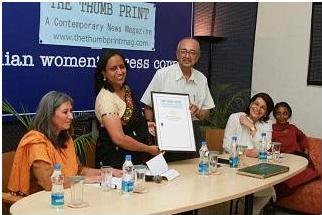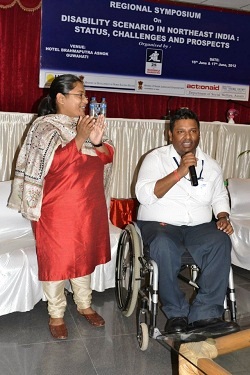One of my fondest and most abiding memories of childhood is being taken to school, perched on the crossbar of my dad's bicycle. It was a leisurely ride to school with very little passing traffic and even if there was, most drivers were considerate. I grew to love this special time with my dad as we exchanged stories and I also took in the sights and more importantly, the smells of those route. The distinct smell emanating from the floor mills and then the bakery became important landmarks for me. However, this idyllic cycling time did not last long. My dad had a minor accident and my mother forbade him to cycle to work and I took the school bus. The wheels of 'progress' were turning slowly-but-surely in Guwahati with the number of cars and buses increasing on the roads.
As many kids of my generation, I learnt to ride the bike on my dad's bike and fondly remember the many bruises and scuffs along the way till the Eureka moment of balancing and manoeuvring the bike on the little lanes near the house. However, any serious cycling did not happen. The cyclist also became a dying breed and the only time you saw any were on trips to rural areas where, the sight of pretty girls in mekhela chadors (traditional attire) on their bikes to school and university would greet your travel-weary eyes.
The heat, humidity, dust, potholes, absence of dedicated cycle lanes, aggressive behaviour of drivers, the down market image of cycling and the rise of the aspirational class brought about the demise of the cyclist in Guwahati. Cycling became limited to recreational activity for kids. I must confess that I myself did not make any concerted effort to bike to work, though I remained a closet admirer of this two-wheeler. When I arrived in the UK, I started to covet ownership of a bicycle over that of a 4 wheeler and was extremely glad to receive a lavender bike from a colleague of mine as she graduated to a more sophisticated one.
My trips to Oxford and Cambridge and other University towns made me see the bicycle as a thing of beauty. There is a certain poetic beauty of a bicycle chained to the railing on the pavement. It elevates an ordinary place to something more lofty. The lovely sound of bicycles cruising cobbled streets is one of the most soothing sounds you will ever hear.
My trip to the continent further opened my eyes to the lethal combination of beauty and functionality of the bicycle. There is nothing this humble mode of transport cannot achieve. Men and women, young and old, all shapes and sizes look lovely and actually very happy on the bike. Mums and dads attach carriers to ferry their children of all ages to the bike. Racers, commuters, mountain bikes, hybrids, tandem bikes, you name it. There is a bike for your need and capacity.
There is so much going for this cool but simple vehicle. It is cheap, it does not have a status quotient attached to it, it does not chuck out fumes, it is not noise polluting, you stay healthy and you are unlikely to mow anyone down. If you really think about it, in cities like Guwahati, you are likely to get to your destination quicker with the sleek bicycle than that massive four wheel drive.
So how do we turn the tide? It requires action on the part of the individual and the state. I am no transport planner but this is what I have seen happen in the country I live in and the countries, I have visited.
1. Use the bicycle. In the UK, the stats department states that there are more bikes in the UK then there are people. This suggests that people understand the health benefits and want to cycle so what stops them?
2. The friendly state. Create safe cycle lanes and give cyclists greater priority at busy intersections. Encourage big companies to have commuter plans that set targets for cycle (as well as public transport) commuting (shower facilities at work essential!).
In the UK, there is a charity called sustrans (www.sustrans.co.uk) which aims to increase the use of foot, cycles and public transport. As I finally mustered the courage to bike to work, I was handed a sheet marking the cycle routes from the sustrans website.
Boris Johnson (Mayor of London) has been a very vocal champion of cycling and London has seen many initiatives to increase cycling. London is busy and congested and on appearance not the cycle friendly city like Amstedam. However, it is also an example of how political leadership and campaign changes people's habits.
Guwahati, does not have a very complicated road network, it is a shame that with so much recent construction and upgrading of roads, a few cycle lanes were not incorporated. Instead of looking to our big metropolises and the American cities, we should look to China and the Continent and closer home to Manipur where there is a real grass-root movement to keep cycling alive. Is it really that difficult to ditch our cars and take the bicycle when we go shopping for our food?
Maybe we will take a leaf out of hilly Manipur and cycle in the flat roads of Guwahati. Let's start using them for little chores. Yes, it'll be hot and it'll be dusty but nothing a shower cannot correct. But yes, we have to stay safe and for that wearing a helmet, following the rules of the road and if we are not cycling ourselves then being aware and showing consideration for that person on the cycle who is making the air a little better for you to breathe may be in order.
Find us on facebook: facebook.com/TheThumbPrintMag







































